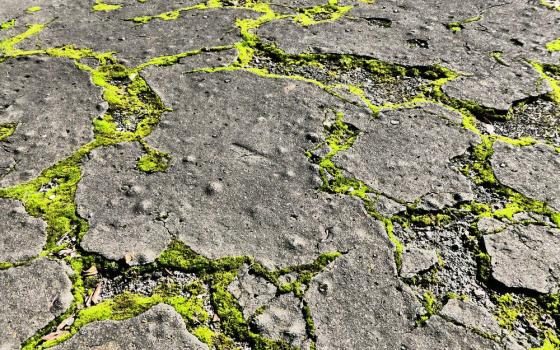"There is a crack, a crack in everything, that's how the light gets in. That's how the light gets in."
The first time I heard this Leonard Cohen song sung by Sara Thomsen a few years ago, it grabbed me. It makes me ponder my response to cracks and letting in light, being challenged to see things in a different, possibly new way. In the last 11 months, those of us living in the United States have been getting cracked with more frequency than we would care to be.
Hold the Super Glue, the plaster, the Band-Aids. What needs to be trimmed, planed and cauterized before we start the mending?
In light of the events of the recent September days and the first week of October, we have been presented with many occasions to reflect, pray and act on how we treat each other, respond to those in need and use our beautiful world in a responsible way.
One of my favorite paragraphs in "Laudato Si': On Care of our Common Home" is paragraph 119, in which Pope Francis connects the healing of our relationship with nature and the environment to the healing of all fundamental human relationships:
Christian thought sees human beings as possessing a particular dignity above other creatures; it thus inculcates esteem for each person and respect for others. Our openness to others, each of whom is a 'thou' capable of knowing, loving, and entering into dialogue, remains the source of our nobility as human persons A correct relationship with the created world demands that we not weaken this social dimension of our openness to others, much less the transcendent dimension of our openness to the "Thou" of God. Our relationship with the environment can never be isolated from our relationship with others and with God.
What light is trying to get in? The weather this first week of October felt more like the first week of July, rather than one of the first weeks of autumn. I am always awed (and sometimes aggravated) by the abundance of nature at this time of year. The sidewalks and lawns are covered with fallen leaves, yet thousands of leaves remain on the trees. The abundance of melons, apples, squash and peppers at the markets is so welcome and overwhelming. The devastation of the storms, hurricanes, earthquakes and volcanoes has left many around the world and in our country without food, clean water and shelter. There is abundance and nothing.
The recent massacre in Las Vegas has broken lives, hearts, and relationships. We grieve for the loss of our sisters and brothers, and for the brother responsible for this crime. Cries for stricter gun laws and safety for everyone abound. How do we relate to each other to listen, understand and heal?
The readings for the liturgical feasts celebrated during the first week of October shed some light on Pope Francis' challenge on how to relate to each other. The two themes that are presented by the witness of St. Thérèse of Lisieux (the "Little Flower"), the guardian angels and St. Francis of Assisi are mercy and humility. Being childlike, open to truth, wonder and love, being present to nature, to the other and listening to her/his truth may help us discover our truth and enable us to accept the truth of the "other."
The reading of October 3 from Zechariah 8, 20-23 struck me as something I never took in before. The last line cracks us open to know our need for others in our seeking of our God: "In those days ten men of every nationality, speaking different tongues, shall take hold, yes, take hold of every Jew by the edge of his garment and say, 'Let us go with you, for we have heard that God is with you.' "
Seeking God happens in our relationships, in our dependence upon those of other languages, religions, cultures. Cardinal Cupich of Chicago preached on this passage at the Red Mass at Holy Name Cathedral on October 3. The Red Mass, dedicated to the Holy Spirit, is traditionally celebrated during the first week of October for lawyers, judges, law students and government officials to seek the guidance of the Holy Spirit in carrying out their ministry of justice and mercy. Cupich said that ours is a ministry of second chances. Through our representation of clients or the government or being a judge, we allow people a chance to set aright their relationships and start again. Mercy and humility.
October 5 marked the end of the period for persons with Deferred Action for Childhood Arrivals status, to renew their work permit if it expires before March 5, 2018. President Donald Trump's termination of this status, known as DACA, on September 5 has been roundly criticized. Might we consider whether this action might be a crack to let in the light? A Dream Act of 2017 has been introduced into both the House and the Senate.
This bipartisan effort would get the young immigrants who are protected from deportation and allowed to work under DACA, out of executive order subject to presidential whim and under the protection of the law. Under the law they would be put on a path to resident status and eventually citizenship.
Do we want these young people to keep circling the airport in the DACA plane that never lands, that never allows them to become full members of U.S. society and keeps them subject to the whim of politics? How do we welcome this crack? Can we bring to light a compassionate immigration law in the next few months? Knowing that God is with us, we live in hope.
[Bernadine Karge is a Dominican Sister of Sinsinawa and an immigration lawyer in Chicago.]

